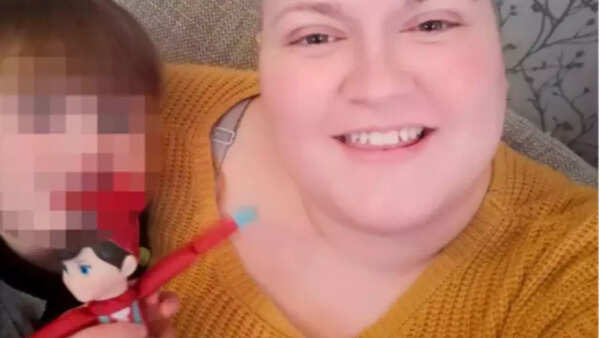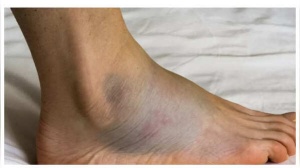Georgia Gardiner, a 28-year-old mother from Leeds, England, is facing a devastating prognosis after what was initially dismissed as heartburn turned out to be a rare and aggressive form of stomach cancer. Her story underscores the importance of advocating for one's health and demanding thorough medical investigation when symptoms persist.
Last summer, Gardiner began experiencing persistent nausea, stomach cramps, and a significant loss of appetite. Doctors attributed her discomfort to acid reflux and prescribed antacids. However, her condition continued to deteriorate rapidly. She lost a substantial amount of weight and struggled to keep food down.
Despite multiple visits to her general practitioner and the local hospital, Gardiner's concerns were repeatedly dismissed as indigestion or heartburn. After months of persistent advocacy, she was finally referred for more specialized testing.

An endoscopy ultimately revealed the horrifying truth: Gardiner had linitis plastica, a rare and aggressive type of stomach cancer. This cancer, sometimes called "leather bottle stomach," causes the stomach lining to thicken, impairing its ability to function properly.
Gardiner received her diagnosis on June 13, 2024. By this time, the cancer had already metastasized, spreading to her lymph nodes and other organs. Doctors delivered the devastating news that her condition was terminal, estimating she had only 12 months to live. Treatment would focus on managing her symptoms and improving her quality of life.
"I felt invincible. I never thought that I would develop cancer at 28. My world fell apart when I was informed that it is incurable," Gardiner shared.
Now, Gardiner is determined to make the most of her remaining time with her fiancé, Callum Scott, and their two-year-old son, Arlo. The couple has accelerated their wedding plans, recognizing the urgency of their situation. Gardiner is focused on creating lasting memories for her family.

"The thing that breaks me is how much I’ll miss in Arlo’s life. He gives my life purpose," she said. Despite the grim prognosis, she remains resolute in her fight against the cancer for her son's sake, vowing to battle it "in every way possible."
Gardiner's message to others is clear: "Had I been taken seriously sooner, perhaps we could have nipped it in the bud before it spread. I just want others to get it in time." She urges everyone to pay attention to their bodies, trust their instincts, and persistently seek answers from medical professionals when something doesn't feel right.

Linitis plastica is a rare type of adenocarcinoma that affects the stomach lining. It's characterized by the stiffening and thickening of the stomach walls, giving it the appearance of a "leather bottle." Due to its rapid progression and often subtle early symptoms, diagnosis typically occurs at a late stage.
Unfortunately, linitis plastica is notoriously difficult to cure, especially once it has spread beyond the stomach wall.
The exact cause of linitis plastica remains unknown. However, it is strongly associated with diffuse-type gastric adenocarcinoma, a specific type of stomach cancer.
Genetic factors, particularly mutations in the CDH1 gene, can play a role. This gene mutation is linked to hereditary diffuse gastric cancer (HDGC), which significantly elevates the risk of developing linitis plastica.
Environmental and lifestyle factors may also contribute to the development of this cancer:
These factors can collectively increase the risk of developing this rare and aggressive form of stomach cancer.
Several factors contribute to the challenges in treating linitis plastica:
Newer articles
Older articles
 5 Overlooked Warning Signs of Colon Cancer: Early Detection Saves Lives
5 Overlooked Warning Signs of Colon Cancer: Early Detection Saves Lives
 Shukla's ISS Arrival Heralds New Era for Indian Space Exploration; Gaganyaan Mission Looms
Shukla's ISS Arrival Heralds New Era for Indian Space Exploration; Gaganyaan Mission Looms
 Vijay Sethupathi Apologizes Amid Controversy Over Son Surya's Film 'Phoenix'; Thalapathy Vijay's Support Revealed
Vijay Sethupathi Apologizes Amid Controversy Over Son Surya's Film 'Phoenix'; Thalapathy Vijay's Support Revealed
 Android Security Alert: Government Warns of Critical Flaws Exposing User Data
Android Security Alert: Government Warns of Critical Flaws Exposing User Data
 Ashada Gupt Navratri 2025: Dates, Significance, and How to Observe This Hidden Festival
Ashada Gupt Navratri 2025: Dates, Significance, and How to Observe This Hidden Festival
 Skin Deep: 7 Warning Signs on Your Skin That Could Signal Heart Trouble
Skin Deep: 7 Warning Signs on Your Skin That Could Signal Heart Trouble
 Smith Eyes Grenada Test Return After Injury Layoff
Smith Eyes Grenada Test Return After Injury Layoff
 Staying Hydrated May Significantly Lower Risk of Heart Failure, New Study Suggests
Staying Hydrated May Significantly Lower Risk of Heart Failure, New Study Suggests
 Moto G54 Price Slashed in India: Check Out the New, Lowered Costs
Moto G54 Price Slashed in India: Check Out the New, Lowered Costs
 Gambhir Sidelines Pant's Twin Tons After India's Test Loss, Emphasizes Team Performance
Gambhir Sidelines Pant's Twin Tons After India's Test Loss, Emphasizes Team Performance